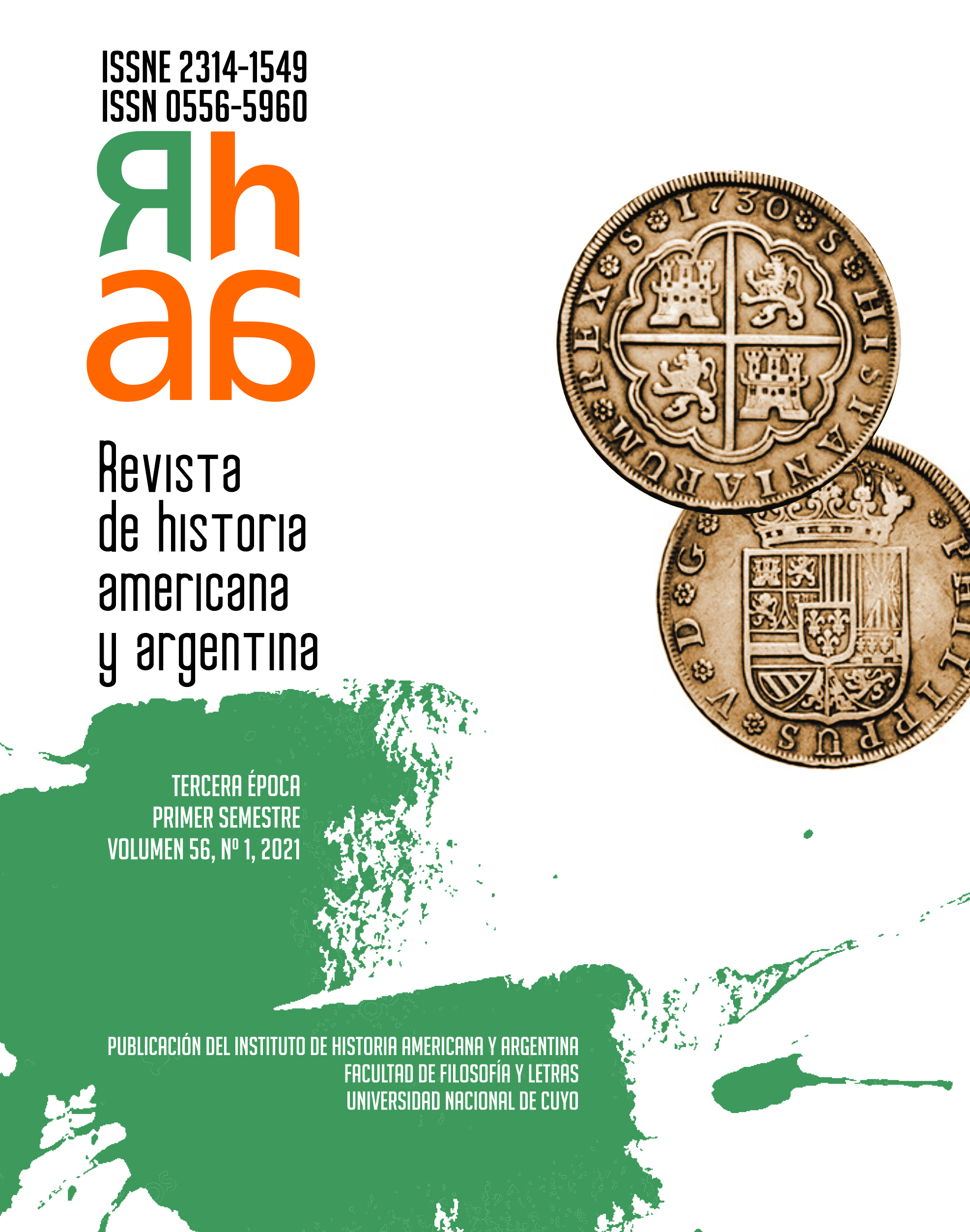Between the valorization of democracy and the collusion with the dictatorship: Political Parties in Corrientes during the ‘Liberating Revolution’
DOI:
https://doi.org/10.48162/rev.44.009Keywords:
political parties, Corrientes, liberating revolutionAbstract
In this article we discuss the experience of antiperonist political parties in the government of the self-proclaimed Liberating Revolution in Corrientes province. Throughout it, we seek to identify the role they assumed in the Federal Intervention, their leaderships, structures and processes of conflict and division, which occurred both within themselves and extra-party level. The work applies theoretical and methodological tools from Political History and the regional approach, with the intention of contributing to the different interpretations of the politics of the period from a provincial perspective. We focus on the analysis of the local written press, specifically the newspapers El Liberal and La Mañana, and other documents such as the Intervention decrees, government reports, correspondence - personal and official - and the oral testimony of one of its actors.
In the open scenario after the military coup, the return to political activity was intertwine by a process of general reorganization in the parties that, occasionally, generated crisis and divisions. The identity reconfigurations and the adaptation of the programs to the new reality derived in a constant transition between the defense of democratic values and the support for the military government.
Downloads
References
Ansaldi, W. (2014). De la Vox populi, Vox Deus, a la Vox populi, Vox Mercatus. La cuestión de la democracia y la democracia en cuestión. Estudios, (31), pp. 13-31. https://doi.org/10.31050/1852.1568.n31
Álvarez, Y. (2016). Aportes para una historia de la Revolución Libertadora en Mendoza. Páginas, 8 (16), pp. 7-24. https://doi.org/10.35305/rp.v8i16.208
Castillo, F. (2016a). Presentación dossier. Páginas, 8 (16), pp. 3-6. https://doi.org/10.35305/rp.v8i16.207
Castillo, F. (2016b). La represión antiperonista y su justificación en Jujuy en tiempos de la Revolución Libertadora. Páginas, 8 (16), pp. 82-98. https://doi.org/10.35305/rp.v8i16.212
Cavarozzi, M. (1983). Autoritarismo y Democracia 1955-1983. C.E.A.L.
Ferreyra, S. (2016). Junta Consultiva y Comisiones Investigadoras en la Provincia de Buenos Aires: usos de la escala para pensar el conflicto peronismo-antiperonismo. Páginas, 8 (16), pp. 44-60. https://doi.org/10.35305/rp.v8i16.210
Ferreyra, S. (2018). El peronismo denunciado. Antiperonismo, corrupción y comisiones investigadoras durante el golpe de 1955. Eudem-GEU.
Lichtmajer, L. (2016). ¿Una crisis de crecimiento? La expansión de la Unión Cívica Radical de Tucumán durante la “Revolución Libertadora”. Páginas, 8 (16), pp. 25-43. https://doi.org/10.35305/rp.v8i16.209
Melón Pirro, J. C. (2009). El peronismo después del peronismo. Resistencia, sindicalismo y política luego del 55. Siglo XXI.
Nun, J. (1973). El control obrero y el problema de la organización. Pasado y Presente, (2-3), 205-232.
O’Donnell, G. (1972). Modernización y autoritarismo. Paidós.
Persello, A. V. (2007). Historia del radicalismo. Edhasa.
Portantiero, J. C. (1973). Clases dominantes y crisis política en la Argentina. En O. Braun (Ed.). El capitalismo argentino en crisis (pp.73-118). Siglo XXI.
Ruffini, M. (2016a). Tiempos antiperonistas en la Patagonia argentina. La acción de las Comisiones Investigadoras durante la “Revolución Libertadora”. Páginas, 8 (16), pp. 61-81. https://doi.org/10.35305/rp.v8i16.211
Ruffini, M. (2016b). Dictadura, dirigencia política y sociedad civil. La persecución al peronismo en la Patagonia Argentina durante la "Revolución Libertadora" (1955-1958). Iberoamérica Social, 1, pp. 89-107. Recuperado de http://iberoamericasocial.com/ojs3/index.php/IS/article/view/279
Smulovitz, C. (1991). En búsqueda de la formula perdida: Argentina 1955-1956. Desarrollo Económico, 31 (121), pp. 113-124. https://doi.org/10.2307/3466730
Solís Carnicer, M. M. (2017). La “Revolución Libertadora” en la provincia de Corrientes. Los partidos políticos, la Iglesia y el Ejército frente al golpe de 1955. Quinto Sol. Revista de Historia, 21 (3), pp. 1-27. http://dx.doi.org/10.19137/qs.v21i3.1129
Solís Carnicer, M. M. (2019). Las paradojas de la política en tiempos de reforma. Partidos, elecciones y prácticas políticas en Corrientes (1909- 1930). ConTexto Libros.
Spinelli, M. E. (2001). El debate sobre el orden político durante los primeros gobiernos antiperonistas, 1955-1958. Anuario del IEHS, 16, pp. 13-37. Recuperado de: http://anuarioiehs.unicen.edu.ar/2001.html
Spinelli, M. E. (2005). Los vencedores vencidos. El antiperonismo y la “revolución libertadora”. Biblos.
Tcach, C. (1994). Partidos y pactos políticos en la Córdoba Libertadora (1955-1958). Estudios, (3), pp. 17-30. Recuperado de: https://revistas.unc.edu.ar/index.php/restudios/article/view/399
Tcach, C. (2012). De la Revolución Libertadora al Cordobazo. Córdoba, el rostro anticipado del país. Siglo XXI.
Valobra, A. (2013). Derechos políticos femeninos en la Junta Consultiva Nacional. Estudios Sociales, 45 (1), pp. 167-201. https://doi.org/10.14409/es.v45i1.4456
Published
How to Cite
Issue
Section
License

This work is licensed under a Creative Commons Attribution-NonCommercial-ShareAlike 4.0 International License.
Quienes envíen trabajos a la Revista de Historia Americana y Argentina, que edita el Instituto de igual nombre de la Facultad de Filosofía y Letras de la Universidad Nacional de Cuyo (Mendoza, Argentina), otorgan automáticamente licencia no exclusiva y sin límite temporal de su manuscrito a dicha publicación. En consecuencia, como la distribución de la citada Revista no tiene finalidad lucrativa sino académica, el autor (los autores) autoriza(n) a la misma la difusión gratuita en formato impreso y medios electrónicos, tanto en red local como por vía internet.
Se establece que:
- Los/as autores/as conservarán sus derechos de autor y garantizarán a la revista el derecho de primera publicación de su obra.
- Los/as autores/as deben adherir a la la Licencia Creative Commons Atribución-NoComercial-CompartirIgual 4.0 Internacional, mediante la cual el autor permite copiar, reproducir, distribuir, comunicar públicamente la obra sin propósitos comerciales, por cualquier medio o formato. También, se pueden generar nuevas obras derivadas, siempre y cuando se cite y reconozca al autor original y su primera publicación en esta revista.
- Los/as autores/as podrán adoptar otros acuerdos de licencia no exclusiva de distribución de la versión de la obra publicada (p. ej.: depositarla en un archivo telemático institucional o publicarla en un volumen monográfico) siempre que se indique la publicación inicial en esta revista.
- Se permite y recomienda a los/as autores/as difundir su obra a través de Internet (p. ej.: en archivos telemáticos institucionales o en su página web) luego de su publicación, lo cual puede producir intercambios interesantes y aumentar las citas de la obra publicada. (Véase El efecto del acceso abierto).

































